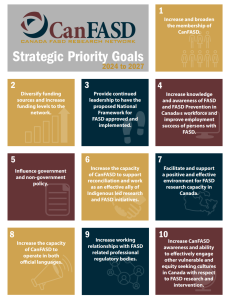CanFASD have just published our new Strategic Priorities Plan for 2024-2027.
The purpose of this document is to guide our work over the next three years. It outlines priority areas that our organization wants to focus on in order to achieve our vision and mission. The Strategic Priorities Plan doesn’t change what we’re doing right now. It just helps us identify areas where we need to do more.
Our Board of Directors has been hard at work developing a comprehensive roadmap to guide CanFASD’s strategies, resources and activities.

The process
The voice of lived experience was instrumental in shaping each of the priorities. CanFASD is committed to including the voice of lived experience in all our work which we do through regular consultations with our Adult FASD Expert Collaboration Team and Family Advisory Committee.
The Board of Directors considered the results of the 2020 to 2023 CanFASD Strategic Plan. It also looked at the changes in the FASD environment in each region and nationally, and internationally. We then identified priority strategies and directions for the next three years. The priorities address key issues and/or opportunities that the Board determined to have the potential to create positive results. These results will support us in working to attain the goals and outcomes of the organization.
Our Strategic Priorities were last updated in 2020 and we continue to expand on each of them. As both CanFASD and society continues to change, we need to ensure that our priorities change with them.
Notable updates in the plan include increasing the capacity of CanFASD to operate in both official languages; increasing working relationships with FASD related professional regulatory bodies; and increasing CanFASD awareness and ability to effectively engage other vulnerable and equity seeking cultures in Canada with respect to FASD research and intervention.
Language
CanFASD has started working toward a transition to both official languages primarily through translation of major reports from English to French and French to English and by offering some of the online courses in French.
We plan to continue to work toward being truly pan Canadian through increasing CanFASD capacity to work in both official languages with communities across Canada.
Professional Regulatory Bodies
Influencing professional regulatory bodies (i.e. professional associations, colleges, societies, board) to recognize FASD knowledge as a required competency for their members will help to provide for sector professional development training and ultimately influence curriculum changes at post-secondary institutions, continuing medical education and professional development.
The opportunity is to significantly increase the numbers of related professionals and practitioners who receive training in and are competent in knowledge relating to FASD. As a result, we will improve access to services and appropriate care and management, and reduce stigma as a barrier.
Equity Seeking Cultures
Canada has diverse cultures which, in turn, have varying perspectives concerning understanding and engaging in FASD research, intervention and support. Many cultural groups are seeing equity in support for members of their communities.
CanFASD is positioned to lead identification and development of effective research practices and protocols as well as to create targeted strategies for information dissemination.
Read the plan now and follow us to stay tuned for updates of the everyday work we’re doing to ensure each priority is carried out.
